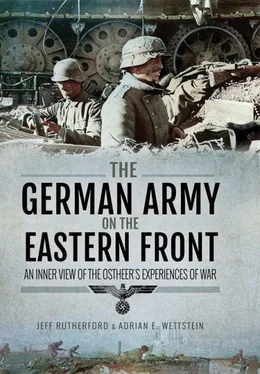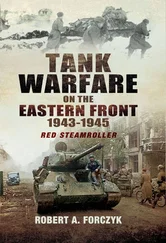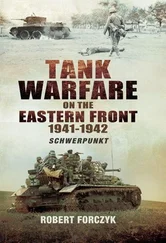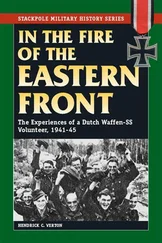c) building and position construction (without Organization Todt)
d) Organization Todt
e) operations, construction, and maintenance of the railroad
f) business, industry, and trade
g) agriculture
h) Luftwaffe (so long as not discharged from the supervision of the OKH)
i) other work
k) total (further distinctions are not to be made)
E) Releases in the past month
a) Lithuanian
b) Latvian
c) Estonian
d) Ukrainian
e) Romanian
f) Finnish
g) Ethnic German
h) White Ruthenian
i) Caucasian and security service, as well as translators
k) Turkic h, i, and k only for auxiliary guard service, police
l) total [27]
This shift towards a policy that now recognized the productive value of prisoners of war reflected broader trends that permeated the army’s approach to occupation policy. The realization that the war would now last at least one more year and that positional warfare reminiscent of the First World War had become the norm for the northern and central fronts meant that elements of the field army’s command moderated their policies in hopes of winning support from the Soviet population under its control, ranging from Generalfeldmarschall von Reichenau’s famous memorandum of early January 1942 to First Panzer Army’s more conciliatory policies in the Caucasus. [28]An order first issued by the OKH on 10 May 1942 that was distributed by Third Panzer Army to its subordinate units three weeks later highlighted the shift in German intentions. [29]
The goal of the struggle that the German soldier leads in the East is the destruction of Bolshevik power. The attitude of the troops towards the peaceful population, as long as they see German soldiers as the emissaries of a new just order, will not be affected in this way. As nowhere else in the occupied European territories, the German has the opportunity in Russia to have his claim to leadership voluntarily recognized by the population. Essential for this is the nature of his behaviour. He should be perceived as master in the east. Mastery should never degenerate into contempt towards the defenceless vanquished. The Russian is obedient and willing when he is treated strictly but fairly. The trusting basis of the population is to be used for a quick pacification of the conquered territory.
It is wrong and detrimental to our own interests to see the native population as without rights and honour on account of their outward proletarian appearance, because, as experience shows, this was only camouflage against Bolshevik terror. The German soldier protects the property of the labouring and peaceful population, he respects the sense of honour of Russian women and girls, he supports the reconstructive work in the rear areas. He must know that capricious acts create opposition, sirs up embitterment and therefore threatens the security of our troops.
Unavoidable forced measures that must be taken for the continuation of the war and which extensively assail the rights of the inhabitants are to be made understandable to the population if possible. The requisitioning of cattle and other goods, whose seizure would have a disgruntling effect, should be tasked to the village elders ( Starosten ) if possible. Through his behaviour, the German soldier is to prove to the civilian population that he is a member of a culturally advanced people, whose dominion will have the effect of releasing the population from the Bolshevik yoke.
On the other side, the mastery of the occupied territories and the exploitation of the countryside demands hardness. All weakness and softness would be out of place. Where civilians revolt against the military authorities’ orders, where they act violently towards or threaten a member of the Wehrmacht, or plan or carry out an act of violence of any type is to be immediately and ruthlessly cracked down on per the previously distributed directives on order of the responsible officer.
These perspectives are of importance for are all measures of the troops. He who avenges cruelties of the Red Army on the defenceless and innocent civilian population helps the enemy cause. The soldier must be the best propagandist for the Greater German Reich though his strict but just treatment of the population.
Such an order indicated two important points. First, the very fact that the army felt the need to issue such a directive indicates that its men had behaved violently towards the Soviet civilian population during the advance and subsequent winter crisis. Second, the army clearly understood that its objective of winning the war militarily would be impaired by a chaotic and rebellious rear area and it hoped to placate the occupied population in order to avoid such problems. These types of ideas and policies trickled down the army hierarchy to the division level across the breadth and depth of the front. [30]For example, the 7th Infantry Division deployed in the centre of the front, ordered that:
the troops are again to be instructed that their demeanour towards the population needs to be correct. Every instance of violent attacks gets around, undermines the trust in the German armed forces and gives Soviet-Russian propaganda welcome fuel and impetus. [31]
Other divisions implemented more tangible policies designed to assist Soviet civilians survive the occupation. Encircled in the Demiansk Pocket by superior Red Army forces and dependent on air drops for its own supplies, the 123rd Infantry Division nonetheless initiated a communal food program for the population in its midst in May 1942.
In order to improve by a small measure the hopeless food situation for some areas of the Russian civilian evacuees until the onset of other assistance, the following provisions should be immediately started:
1) The sector commander will responsibly determine in consultation with the respective military doctor those localities in which the food situation is so bad that aid measures need to be introduced.
2) In those localities as determined in accordance with number 1, communal feeding is to be established throughout the sector. In general, the communal food should consist of a warm soup each day, and should be disbursed to the civilian population not local to the area, under the supervision of the German security organs and with the assistance of the responsible Russian mayor. Appropriate measures must be taken so that the entire evacuated population is actually treated equally and, for example, no double portions.
3) For the evacuees’ food, the sectors are to allocate food in the fixed ration rates for the Russian population that works in the service of the German Wehrmacht as long as the stocks allow. The numbers being fed is to be reported at the same time in accordance to number 6.
4) In return for this food, the population is to be used for work for the Wehrmacht (also quarters and defensive position construction), as well as for agricultural help. The communal feeding is to be exploited for propaganda for us when possible.
5) Any costs (outside those in accordance to number 3) will not be paid for by the Reich.
6) The section commanders must be clear that this additional food comes at the cost of burdening the entire transportation system. Therefore, especially strict standards are to be applied. The localities identified in accordance with number 1 are to be immediately reported to the Division Ib [quartermaster] about the necessary developing communal feeding with the details of the number of evacuees that need to be fed and with the section of economic troops tasked with feeding them.
7) I request that the section groups, deployed for as an intensive cultivation of the fields as possible, are above all to ensure that the minimal available seeds should not used at the last minute, but rather to take measures to ensure the protection of the sprouting seeds in order to benefit fully from the securing of food.
Читать дальше






![John Stieber - Against the Odds - Survival on the Russian Front 1944-1945 [2nd Edition]](/books/405234/john-stieber-against-the-odds-survival-on-the-russian-front-1944-1945-2nd-edition-thumb.webp)





